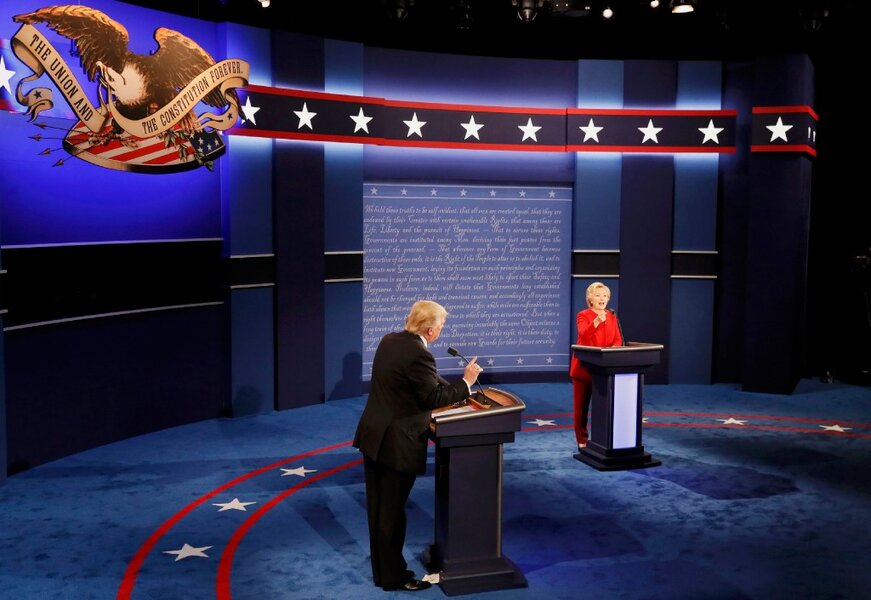At each other from the start: Clinton, Trump debate
Loading...
| HEMPSTEAD, N.Y.
Hillary Clinton and Donald Trump tangled Monday night over trade, taxes and how to bring good-paying jobs back to the United States as they opened their first face-to-face presidential debate.
Democrat Clinton said her Republican rival was promoting a "Trumped-up" version of trickle-down economics — a philosophy focused on tax cuts for the wealthy. She called for increasing the federal minimum wage, spending more on infrastructure projects and guaranteeing equal pay for women.
Trump panned policies that he said have led to American jobs being moved overseas, in part because of international trade agreements that Clinton has supported. He accused her of backing away from her support for trade deals for political gain.
"Secretary Clinton and others, politicians, should have been doing this for years," Trump said, contending she and Obama have done little or nothing to stop jobs from flowing overseas.
Disputing his version of events, she said, "I know you live in your reality."
The televised face-off was the most hotly anticipated moment in an election campaign that has been both historic and unpredictable. Both sides were expecting a record-setting audience, reflecting the intense national interest in the race to become America's 45th president.
The 90-minute televised debate comes six weeks before Election Day and with early voting already getting underway in some states. Despite Clinton's advantages, including a sophisticated get-out-the-vote operation and a favorable electoral map, the race is exceedingly close.
For Clinton and Trump, the first of three debates was a crucial moment to boost their standing with voters who view both candidates negatively. Clinton struggles with questions about her trustworthiness, while Trump has yet to prove to some voters that he has the basic qualifications to serve as commander in chief.
The candidates' families filed into the debate hall at New York's Hofstra University moments before Clinton and Trump took the stage. Their spouses, former President Bill Clinton and Melania Trump, shook hands before taking their seats.
Clinton aides spent the days leading up to the debate appealing for the media and voters to hold Trump to a higher standard than they believe he has faced for much of the campaign. Their concern is that if the sometimes-bombastic Trump manages to keep his cool onstage, he'll be rewarded — even if he fails to flesh out policy specifics or doesn't tell the truth about his record and past statements.
Trump's campaign has accused Clinton of trying to pre-determine the outcome and said their concerns reflected worries about the Democrat's debating skills.
The centerpiece of Trump's campaign has been a push for restrictive immigration measures, including a physical wall along the U.S.-Mexico border and an early proposal to temporarily bar foreign Muslims from coming to the U.S. But he's been less detailed about other ideas, including his plan for stamping out the Islamic State group in the Middle East.
Clinton, a former senator and secretary of state, is banking on voters seeing her as a steady hand who can build on the record of President Barack Obama, whose popularity is rising as he winds down his second term in office. She's called for expanding Obama's executive orders if Congress won't pass legislation to overhaul the nation's immigration system and for broader gun control measures. Overseas, she's called for a no-fly zone in Syria but has vowed to keep the military out of a large-scale ground war to defeat the Islamic State group.
For Clinton, victory in November largely hinges on rallying the same young and diverse coalition that elected Obama but has yet to fully embrace her.
Trump has tapped into deep anxieties among some Americans, particularly white, working-class voters who feel left behind in a changing economy and diversifying nation. While the real estate mogul lacks the experience Americans have traditionally sought in a commander in chief, he's banking on frustration with career politicians and disdain for Clinton to push him over the top on Election Day.







